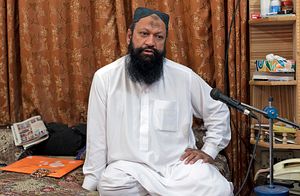On July 29, 2015, Malik Ishaq, co-founder and current leader of the banned sectarian outfit Lashkar-e-Jhangvi, his two sons Usman and Haq Nawaz, and 11 other militants were killed during a shootout after gunmen attacked a police convoy in which they were being transported, police said. The authorities added: “Malik Ishaq and his sons were arrested by the Counter-Terrorism Department (CTD) a week ago. Following their latest arrest, the police had interrogated them and had subsequently taken them to Shahwala in Punjab’s Muzaffargarh district to aid the police in recovering weapons and explosives.”
A CTD spokesman said that 12 to 15 terrorists attacked the police convoy. The subsequent gun battle left at least six police injured. A large cache of weapons and ammunition was recovered from the gunmen and an investigation is underway, the police said.
According to police records, Malik Ishaq had confessed to 11 murders, involvement in at least 57 murders, one murder attempt, and more than 17 acts of banditry. Cases against him include an attack on the Iranian consul in Multan, Khana-e-Farhang-e-Iran, and the killing of a number of police officers and government officials belonging to the Shia sect. Ishaq had been charged with more than 100 murders, and was involved in 45 criminal cases. The latest charge was masterminding the attack on the Sri Lankan cricket team in Lahore in March 2009 while he was in jail. While Khaled Ahmed, the consulting editor of Newsweek Pakistan, writes: “Ishaq was wanted in 45 cases, involving 70 murders, out of which he had been acquitted in 37 and awarded bail in eight. The last case, involving planning—from prison—the attack on the Sri Lankan cricket team in Lahore in 2009 has concluded in another bail at the Supreme Court after which he has been released.”
Ishaq’s lawyer, Misbah ul Haq claimed that Ishaq was acquitted in 35 cases due to lack of evidence. According to his lawyer, he was granted bail in seven cases and discharged in one case, and was only sentenced in two cases. Ishaq had, according to his lawyer, completed his sentences.
After 9/11, independent Pakistani analysts say that Malik Ishaq joined hands with the Al-Qaeda and the Tehrik-e-Taliban Pakistan (TTP), a link that enabled him to rise to prominence. The United States placed Malik Ishaq on its list of most wanted international terrorists, and kept his outfit, the LeJ, on the international terrorist organization list.
Ahmed continues in his Newsweek Pakistan column, “Ishaq headed a union of shopkeepers in Rahim Yar Khan when he fell under the thrall of Maulana Haq Nawaz Jhangvi, the founder of the Shia-apostatizing Sipah-e-Sahaba.”
Malik Ishaq was a member of the Sipah-e-Sahaba Pakistan (SSP), which he joined in 1989 after meeting Haq Nawaz. When the SSP joined the Milli Yahkjehti Council, which was an alliance of the country’s religious parties and groups – including Shias – Ishaq formed the LeJ along with his close aides. That same year, he escaped along with his close aides from the custody of the Police, but he later again arrested in 1997 in the wake of killing of Five Iranian Military Personnel in Rawalpindi.
Since his 2011 release, police and the provincial authorities in Punjab often placed Ishaq under house arrest, hoping to reduce sectarian tensions.
More recently, in February 2013, Pakistani police arrested Ishaq in connection with attacks on January 10 and February 16, 2013 in the northwestern city of Quetta, which killed nearly 200 Pakistani Shia Hazara civilians. LeJ claimed responsibility for the Quetta bombings.
Sectarian Violence
Pakistan began to be riven by sectarian violence around the time of former dictator Mohammad Zia-ul-Haq (1977-88). Zia-ul-Haq Islamized the country and imposed sharia law, opinions on which differ among Shia and Sunni. The schism between Shia and Sunni widened with the money that poured in from Saudi Arabia and Iran after the 1980s. Amid these changes, the SSP was founded by Maulana Haq Nawaz Jhangvi in Jhang, Punjab. Gradually, its network spread across the country. According to government officials, the SSP has been involved in high-profile attacks against Pakistani Shias.
Ahmed notes that the Sipah-e-Sahaba became increasingly involved in formal politics, requiring it to spin off its militant wing. That led to the creation of several groups, with names like Jhangvi Tigers, al-Haq Tigers, al-Farooq, al-Badr and Allahu Akbar, formed to spread terror in Karachi, Jhang, Chiniot, Samundari, and Faisalabad. They later merged to become Lashkar-e-Jhangvi in 1996. That group has since been regarded as the most dangerous of Pakistan’s sectarian outfits, and has been responsible for large-scale attacks on Pakistan’s Shia minority.
Sunni sectarian groups have also tried to play a spoiler role in relations between Tehran and Islamabad Vali Nasr writes: “When in September 1997, five Iranian military personnel were assassinated in Rawalpindi, the Iranian and Pakistani Governments depicted the attack as a deliberate attempt at damaging relations between the two countries. The killing of 25 Shias in Lahore in January 1998 escalated tensions between the two countries further as Iran openly warned Pakistan about the spread of sectarian conflict.”
Some analysts believe that the killing of Ishaq and his sons will only escalate sectarian tensions. They point out that Lashkar-e-Jhangvi has not only carried out large-scale and high profile attacks against Shias, but has also been linked to major attacks such as the assassination of former Prime Minister Benazir Bhutto.
The author is a columnist at the Daily Times. Visit his blog or follow him on Twitter @Akbar_notezai. He can be reached at [email protected].

































